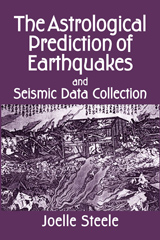
THE ASTROLOGICAL PREDICTION
OF EARTHQUAKES
and Seismic Data Collection (2020)
For anyone interested in exploring the prediction of earthquakes, The Astrological Prediction of Earthquakes and Seismic Data Collection, by author and astrologer Joelle Steele, is now available in its 6th edition in both print and ebook editions. First published in 1994 and reissued with updates in 1998, 2003, 2009, 2013, and now 2020, the author's Seismic Data Collection has more than doubled and now includes the dates, times, and epicenters for more than 3,500 earthquakes and volcanic eruptions dating from 831 BC through August 2020. The data in The Astrological Prediction of Earthquakes includes death tolls, monetary damages, geographical ranges, and epicenters (when available). Also included in this book is a brief history of earthquakes; methods of prediction and measurement; astrological theories of prediction; information on working with historical data, data sources, and conflicting data; a glossary of place names; chart data for selected cities and countries; and a short reference bibliography. 200 pgs.
Paperbacks ship FREE via Media Mail throughout the United States. Non-U.S. paperback book orders please visit: Alibris. Ebooks are shipped FREE worldwide via email within 24 hours of receipt of your order.
PAPERBACK $9.95
EBOOK-KINDLE (MOBI) $5.99
EBOOK-EPUB $5.99
REVIEWS
This is quite an interesting book. I am not an astrologer, but I am interested in methods of predicting quakes and found it very intriguing. You also provided a fantastic database of quakes. - M. Luchetti, Canberra, Australia
Thanks for confirming my suspicions about predictive methods for mundane events. I agree with your assessment of the problem, especially about the timing of the events and the widespread areas affected. - Jordan Hosteler, Brooklyn, New York
I liked this book a lot, especially the seismic data collection. I have been trying to predict quakes for years with no luck, and now I think I see the problem more clearly. I will experiment more with the data to see how it goes. - Hannah Kappen, Berkeley, California.
